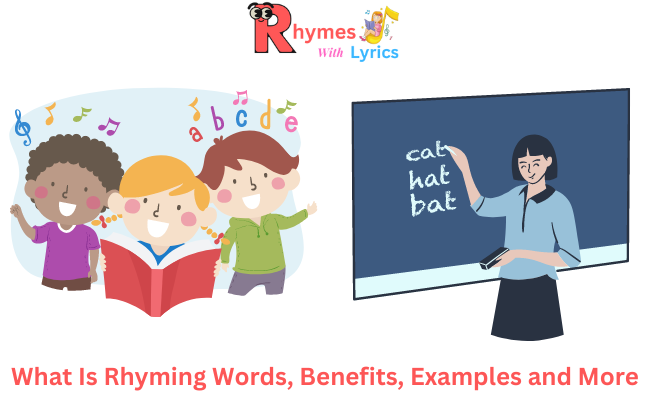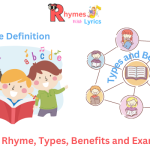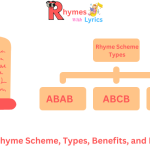Rhyming words refer to those words that have the same phonetics in their last words to make sense while getting the sentence completed.
The term ‘rhyme’ is also called ‘rime.’ However, in the current days, people mostly use the term rhyme.
It’s essential that a rhyme should have matching words in the end while echoing similar sounds.
Some of the examples of rhyming words can be “boon” or “goon.”
There can be plenty of other examples as well.
For example; air, bare, care, dare, fare, and many more words that end with similar phonetics in the end.
Rhyming Words Definition
From the above discussion we got the meaning, it’s clear that rhyming words are a special arrangement of words in sentences that sound similar.

However, without creativity, it’s extremely difficult to get rhyming words to work.
For example; An, ban, can, ant, can’t, & rant.
Rhyming words should work in tandem with the overall sense of the poem. These words are an integral part of songs, dramas, and poems.
What Are the Benefits of Rhyming Words?
Rhyming words are really fun. When you use these words in a poem or song, they make the creative work more spectacular and interesting.
For example, you can check out this poem:
My room’s colour is red,
There are lots of books and a bed.
You won’t find any dirt in my room,
Every morning, I clean it with a broom.
There are lots of books,
Some teach us to play and others teach us to cook.
There are many plants
Some are old, and others are infants.
My room is really beautiful,
Here, you’ll always feel cool.
The poem just shows you the meticulous use of rhyming words in order to make sense. Apart from making a poem more readable, these words enthrall readers, too.
Here are the proven benefits of using rhyming words in a poem:
A fun-filled activity
Reading poems containing rhythmic words from start to end is full of fun. Readers and teachers enjoy reading these poems and reciting them.
Learning these poems can be really fun. When rhyming words are used in songs, poems, and rhymes; readers find them easier to read and recite in a class.
Easy To Memorize
The use of rhyming words in a poem makes it more readable. Readers can easily memorise these poems and even recall them in a school contest or other extracurricular activities.
Improves Vocabulary Power
Rhyming words are easy to memorize and make people more attentive to the poem. Through the use of melodious words, you can start falling in love with them. And young readers or little learners will love reading them. In turn, reading these words can improve vocabulary power.
Enhances Your Creative Skills
Rhyming words used in songs and poems can help improve the level of creativity in little kids. When they listen to those rhyming words, they tend to create images in their minds. It indirectly stimulates their creative skills and gives wings to their imagination.
Appreciate the Beauty of Language
You can explore the beauty of the English language even more by reading out rhyming words. It will enhance your interest in the English language and you’ll be curious to know more about other poets. You’ll love reading their poems.
The Use of the Right Words at the Right Time
When you read more poems, you’ll know more about the use of words and their connotations. When you start reading more poems, you’ll also understand the art of using them. You can use these rhyming words in various sentences in the right context.
As far as the rhyming words definition goes, you can call them a group of words that sound similar and have excessive use in poems and literature.
Rhyming Words Examples
You’ll get plenty of rhyming words examples. But before we go further, it’s important to understand their use and essence.
In perfect rhymes, rhyming words are used in perfect order.
For example:
I am reading a book,
To learn how to cook!
In short, rhyming words that sound almost the same in the end are primarily used in perfect rhymes.
Other types of rhyming words can be found in general rhymes and alliterations.
For example;
Peter, Peter, pumpkin eater,
He loved to play the guitar!
Just see the words: eater and guitar. Though these words sound the same phonetically as far as their last syllables are concerned, they don’t sync the same as we saw in the perfect rhyme example.
The other type of rhyming words you will see are those that are used in eye rhymes.
For example;
I saw a little cat,
She was fat.
She had eyes so blue,
She was beautiful too.
She danced and meowed,
Made us astounded!!
Here, rhyming words played a key role in letting you know the look of the cat. If these words had no rhythm or similar sound in the end, the mere description of the cat wouldn’t look so good. But meowed and astounded don’t sound exactly the same, that’s why it’s an eye rhyme.
How To Teach Rhyming Words To Children?
If you are interested in teaching rhyming words to children, the following tips and tricks can help:
Randomly Point Out Rhyming Words
Whether you are in the midst of a poem or prose, it’s always great to let kids know about words that rhyme. For example, you can point out how the words like kids, deeds, feed, and greed almost sound the same in the end.
The best way to introduce kids to rhyming words is to gradually let them know a pair of two rhyming words every alternative day.
Recite Nursery Rhymes
Reciting nursery rhymes aloud in front of kids can help. When teachers recite melodious nursery rhymes, it becomes easier for kids to learn and memorise the same. Once a kid successfully recognizes rhymes, it makes them more curious about the sequence.
For example;
If a teacher asks what’s your hobby…
I can say to play with my doggie!!
Thus, rhymes are fun. Once a kid learns how to use them in sequence, they would absolutely love composing rhymes.
Create Rhymes
You can ask kids to compose rhymes. Kids love making rhyming words that match each other with or without sense. It can gradually make them more creative and smarter.
You can ask kids to say any five words that rhyme with “Ball” or “Cat.”
Kids would love making these rhyming words and noting down the same on their copies. The more a kid practices, the better he or she’ll become at composing their own poems.
Sing Songs That Rhyme
You should play songs that have multiple rhyming words in them. Play soothing melodious tracks that are pleasant. When you play these songs in front of kids, they would love the idea.
Gradually, you’ll even see them reciting these songs.
For example, you can sing this song for kids:
My dear Tom cat…
Don’t do mischief…
You are all cats’ chief.
Dear, dear, Tom cat…
Come and drink milk,
Else, you’ll fall sick.
Do some exercise,
To stay healthy and wise.
Always stay in my house,
But don’t hurt Lucy—my pet mouse.
Rhyming Word Games
Organizing rhyming word games for kids is also a brilliant idea. You can ask kids to fill in the blanks with suitable words. Also, you can ask kids to write multiple couplets (poems of two sentences with rhyming words). Some words that do rhyme are: hat, mat, cat, etc.
Play rhyming games with kids and ask them to recite their favourite nursery rhymes and point out rhyming words. It’ll be indeed interesting.
Few more activities on rhyming words
Rhyming words end with a similar sound. Here are a few activities on rhyming words that teachers and educators can follow:
Rhyming Words Contest
In an interactive session in the presence of kids and other teachers, you can ask each participant to create a pair of rhyming words. Suppose, there are a total of 20 participants; by asking them to write two rhyming words—you get a total of 40 rhyming words.
Now, you can create four teams comprising 5 members each. Simply ask each team to write a poem using those 40 rhyming words. After a day, you’ll have four poems to evaluate and scrutinize. Based on merit, you can eventually decide which team wins the contest.
Rhyming Buddy
Here, you can ask each kid to find a buddy. Then both kids should recite the same poem word by word. As a teacher, you can eventually decide who recites the poem better.
Identify the Object
You can show a particular object to a kid. Based on their understanding they have to find out any four rhyming words that match the object.
For example, a teacher can show her pen. Now kids have to find out any four words that rhyme with the term ‘pen.’ Going with the above example, you can say… Pen, Den, Bane, Chain, and lane among others.
Favourite Poem
You can ask kids to recite their favourite poems. Every kid will get a single opportunity in it. When kids engage more with such a type of activity, it’ll help them memorize the poem better.
Recite and Remember
It is one of the simplest ways to help kids remember poems. All you need to do is recite poems and ask students to remember the same. After completing the poem, you can ask students to repeat the poem. One who does it successfully will be the winner. You can give him or her a nursery rhyme book as a kind gesture.
In Conclusion
From the above discussion, it’s clear that there is no dearth of rhyming words in English. However, students may not be able to learn and start using rhyming words in their poems or rhymes as long as they don’t practice the same.
Rhyming words form the core of English prose and poetry. It’s better for students to learn them early in their lives. Apart from various other benefits, if you have good command over the usage of rhyming words, you can speak and communicate well in English.
FAQ’s on Rhyming Words
What is in rhyming words?
In rhyming words, you get the same syllables that pronounce almost exactly the same in consecutive lines. It makes the poem rhythmic and melodious. A poem with rhyming words is easy to learn, recite, and memorize.
Are rhyming words easy to read?
Yes, rhyming words are easy to read and write. You can even learn a lot of rhyming words just by listening to them.
Why do we use rhyming words?
Here are five reasons why we use rhyming words in poems:
#1) Makes the poem appealing.
#2) It helps us know the rhythms of the words
#3) Makes a poem easy for readers to read and memorize
#4) Creates interest in young readers to write poems.



